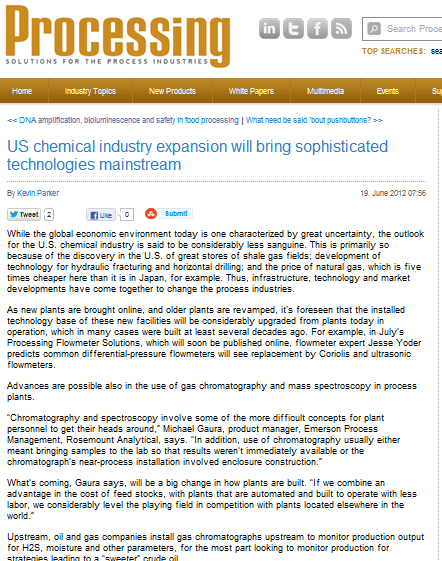 We’ve explored in several posts the impact shale gas is having on the U.S. oil and gas industry. A Processing magazine article, US chemical industry expansion will bring sophisticated technologies mainstream, explores its impact on the chemical industry and the technologies to improve production efficiency.
We’ve explored in several posts the impact shale gas is having on the U.S. oil and gas industry. A Processing magazine article, US chemical industry expansion will bring sophisticated technologies mainstream, explores its impact on the chemical industry and the technologies to improve production efficiency.
The article’s author, Kevin Parker, notes the positive outlook for chemical producers is due to:
…the discovery in the U.S. of great stores of shale gas fields; development of technology for hydraulic fracturing and horizontal drilling; and the price of natural gas, which is five times cheaper here than it is in Japan, for example. Thus, infrastructure, technology and market developments have come together to change the process industries.
In the article, Emerson’s Michael Gaura, a member of the Rosemount Analytical team, provides his thoughts on what the future holds with respect to analytical instruments given these economic trends. You may recall Michael from an earlier post, Integrating Gas Chromatographs with Control and Device Management.
Michael notes that gas chromatographs involve concepts that are more difficult for plant personnel than typical measurement instrumentation. The desire of process manufacturers is:
…to move away from lab testing or having to treat analytic instruments with kids’ gloves. “Given a certain degree of comfort with the technology,” Gaura says, “what these companies want are more robust devices, with wider temperature ranges, a smaller footprint and less power consumption.”
He describes how different industries use gas chromatographs. For oil and gas producers:
…monitor production output for H2S [hydrogen sulfide], moisture and other parameters, for the most part looking to monitor production for strategies leading to a “sweeter” crude oil.
For ethylene producers, Michael shares that:
“…you can tailor for different feed stocks, having alternate, multiple streams configured for olefins or even oil, making it much easier on the end users.”
He foresees that the next-generation chemical plants being built, thanks to abundant natural gas supply, will embrace chromatography as part of their design and workflow.
Kevin closes the article by asking:
What other technologies have a chance to go mainstream based on an expanding chemical industry?
What do you think?




